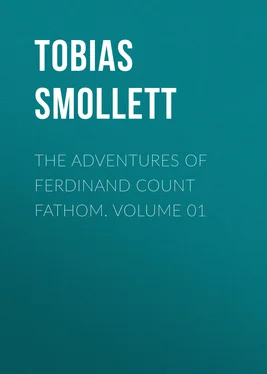Tobias Smollett - The Adventures of Ferdinand Count Fathom. Volume 01
Здесь есть возможность читать онлайн «Tobias Smollett - The Adventures of Ferdinand Count Fathom. Volume 01» — ознакомительный отрывок электронной книги совершенно бесплатно, а после прочтения отрывка купить полную версию. В некоторых случаях можно слушать аудио, скачать через торрент в формате fb2 и присутствует краткое содержание. Жанр: Прочие приключения, Прочие приключения, foreign_antique, foreign_prose, на английском языке. Описание произведения, (предисловие) а так же отзывы посетителей доступны на портале библиотеки ЛибКат.
- Название:The Adventures of Ferdinand Count Fathom. Volume 01
- Автор:
- Жанр:
- Год:неизвестен
- ISBN:нет данных
- Рейтинг книги:4 / 5. Голосов: 1
-
Избранное:Добавить в избранное
- Отзывы:
-
Ваша оценка:
- 80
- 1
- 2
- 3
- 4
- 5
The Adventures of Ferdinand Count Fathom. Volume 01: краткое содержание, описание и аннотация
Предлагаем к чтению аннотацию, описание, краткое содержание или предисловие (зависит от того, что написал сам автор книги «The Adventures of Ferdinand Count Fathom. Volume 01»). Если вы не нашли необходимую информацию о книге — напишите в комментариях, мы постараемся отыскать её.
The Adventures of Ferdinand Count Fathom. Volume 01 — читать онлайн ознакомительный отрывок
Ниже представлен текст книги, разбитый по страницам. Система сохранения места последней прочитанной страницы, позволяет с удобством читать онлайн бесплатно книгу «The Adventures of Ferdinand Count Fathom. Volume 01», без необходимости каждый раз заново искать на чём Вы остановились. Поставьте закладку, и сможете в любой момент перейти на страницу, на которой закончили чтение.
Интервал:
Закладка:
This situation is melodramatic rather than romantic, as the word is used technically in application to eighteenth and nineteenth-century literature. There is no little in Fathom, however, which is genuinely romantic in the latter sense. Such is the imprisonment of the Countess in the castle-tower, whence she waves her handkerchief to the young Count, her son and would-be rescuer. And especially so is the scene in the church, when Renaldo (the very name is romantic) visits at midnight the supposed grave of his lady-love. While he was waiting for the sexton to open the door, his "soul . . . was wound up to the highest pitch of enthusiastic sorrow. The uncommon darkness, . . . the solemn silence, and lonely situation of the place, conspired with the occasion of his coming, and the dismal images of his fancy, to produce a real rapture of gloomy expectation, which the whole world could not have persuaded him to disappoint. The clock struck twelve, the owl screeched from the ruined battlement, the door was opened by the sexton, who, by the light of a glimmering taper, conducted the despairing lover to a dreary aisle, and stamped upon the ground with his foot, saying, 'Here the young lady lies interred.'"
We have here such an amount of the usual romantic machinery of the "grave-yard" school of poets–that school of which Professor W. L. Phelps calls Young, in his Night Thoughts, the most "conspicuous exemplar"–that one is at first inclined to think Smollett poking fun at it. The context, however, seems to prove that he was perfectly serious. It is interesting, then, as well as surprising, to find traces of the romantic spirit in his fiction over ten years before Walpole's Castle of Otranto. It is also interesting to find so much melodramatic feeling in him, because it makes stronger the connection between him and his nineteenth-century disciple, Dickens.
From all that I have said, it must not be thought that the usual Smollett is always, or almost always, absent from Count Fathom. I have spoken of the dedication and of the opening chapters as what we might expect from his pen. There are, besides, true Smollett strokes in the scenes in the prison from which Melvil rescues Fathom, and there is a good deal of the satirical Smollett fun in the description of Fathom's ups and downs, first as the petted beau, and then as the fashionable doctor. In chronicling the latter meteoric career, Smollett had already observed the peculiarity of his countrymen which Thackeray was fond of harping on in the next century–"the maxim which universally prevails among the English people . . . to overlook, . . . on their return to the metropolis, all the connexions they may have chanced to acquire during their residence at any of the medical wells. And this social disposition is so scrupulously maintained, that two persons who live in the most intimate correspondence at Bath or Tunbridge, shall, in four-and-twenty hours . . . meet in St. James's Park, without betraying the least token of recognition." And good, too, is the way in which, as Dr. Fathom goes rapidly down the social hill, he makes excuses for his declining splendour. His chariot was overturned "with a hideous crash" at such danger to himself, "that he did not believe he should ever hazard himself again in any sort of wheel carriage." He turned off his men for maids, because "men servants are generally impudent, lazy, debauched, or dishonest." To avoid the din of the street, he shifted his lodgings into a quiet, obscure court. And so forth and so on, in the true Smollett vein.
But, after all, such of the old sparks are struck only occasionally. Apart from its plot, which not a few nineteenth-century writers of detective-stories might have improved, The Adventures of Ferdinand Count Fathom is less interesting for itself than any other piece of fiction from Smollett's pen. For a student of Smollett, however, it is highly interesting as showing the author's romantic, melodramatic tendencies, and the growth of his constructive technique.
G. H. MAYNADIER
THE ADVENTURES OF FERDINAND COUNT FATHOM
TO DOCTOR –
You and I, my good friend, have often deliberated on the difficulty of writing such a dedication as might gratify the self-complacency of a patron, without exposing the author to the ridicule or censure of the public; and I think we generally agreed that the task was altogether impracticable.–Indeed, this was one of the few subjects on which we have always thought in the same manner. For, notwithstanding that deference and regard which we mutually pay to each other, certain it is, we have often differed, according to the predominancy of those different passions, which frequently warp the opinion, and perplex the understanding of the most judicious.
In dedication, as in poetry, there is no medium; for, if any one of the human virtues be omitted in the enumeration of the patron's good qualities, the whole address is construed into an affront, and the writer has the mortification to find his praise prostituted to very little purpose.
On the other hand, should he yield to the transports of gratitude or affection, which is always apt to exaggerate, and produce no more than the genuine effusions of his heart, the world will make no allowance for the warmth of his passion, but ascribe the praise he bestows to interested views and sordid adulation.
Sometimes too, dazzled by the tinsel of a character which he has no opportunity to investigate, he pours forth the homage of his admiration upon some false Maecenas, whose future conduct gives the lie to his eulogium, and involves him in shame and confusion of face. Such was the fate of a late ingenious author [the Author of the "Seasons"], who was so often put to the blush for the undeserved incense he had offered in the heat of an enthusiastic disposition, misled by popular applause, that he had resolved to retract, in his last will, all the encomiums which he had thus prematurely bestowed, and stigmatise the unworthy by name–a laudable scheme of poetical justice, the execution of which was fatally prevented by untimely death.
Whatever may have been the fate of other dedicators, I, for my own part, sit down to write this address, without any apprehension of disgrace or disappointment; because I know you are too well convinced of my affection and sincerity to repine at what I shall say touching your character and conduct. And you will do me the justice to believe, that this public distinction is a testimony of my particular friendship and esteem.
Not that I am either insensible of your infirmities, or disposed to conceal them from the notice of mankind. There are certain foibles which can only be cured by shame and mortification; and whether or not yours be of that species, I shall have the comfort to think my best endeavours were used for your reformation.
Know then, I can despise your pride, while I honour your integrity, and applaud your taste, while I am shocked at your ostentation.–I have known you trifling, superficial, and obstinate in dispute; meanly jealous and awkwardly reserved; rash and haughty in your resentments; and coarse and lowly in your connexions. I have blushed at the weakness of your conversation, and trembled at the errors of your conduct–yet, as I own you possess certain good qualities, which overbalance these defects, and distinguish you on this occasion as a person for whom I have the most perfect attachment and esteem, you have no cause to complain of the indelicacy with which your faults are reprehended. And as they are chiefly the excesses of a sanguine disposition and looseness of thought, impatient of caution or control, you may, thus stimulated, watch over your own intemperance and infirmity with redoubled vigilance and consideration, and for the future profit by the severity of my reproof.
These, however, are not the only motives that induce me to trouble you with this public application. I must not only perform my duty to my friends, but also discharge the debt I owe to my own interest. We live in a censorious age; and an author cannot take too much precaution to anticipate the prejudice, misapprehension, and temerity of malice, ignorance, and presumption.
Читать дальшеИнтервал:
Закладка:
Похожие книги на «The Adventures of Ferdinand Count Fathom. Volume 01»
Представляем Вашему вниманию похожие книги на «The Adventures of Ferdinand Count Fathom. Volume 01» списком для выбора. Мы отобрали схожую по названию и смыслу литературу в надежде предоставить читателям больше вариантов отыскать новые, интересные, ещё непрочитанные произведения.
Обсуждение, отзывы о книге «The Adventures of Ferdinand Count Fathom. Volume 01» и просто собственные мнения читателей. Оставьте ваши комментарии, напишите, что Вы думаете о произведении, его смысле или главных героях. Укажите что конкретно понравилось, а что нет, и почему Вы так считаете.












